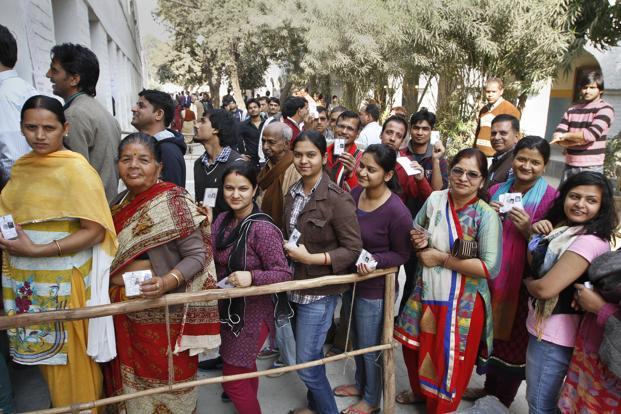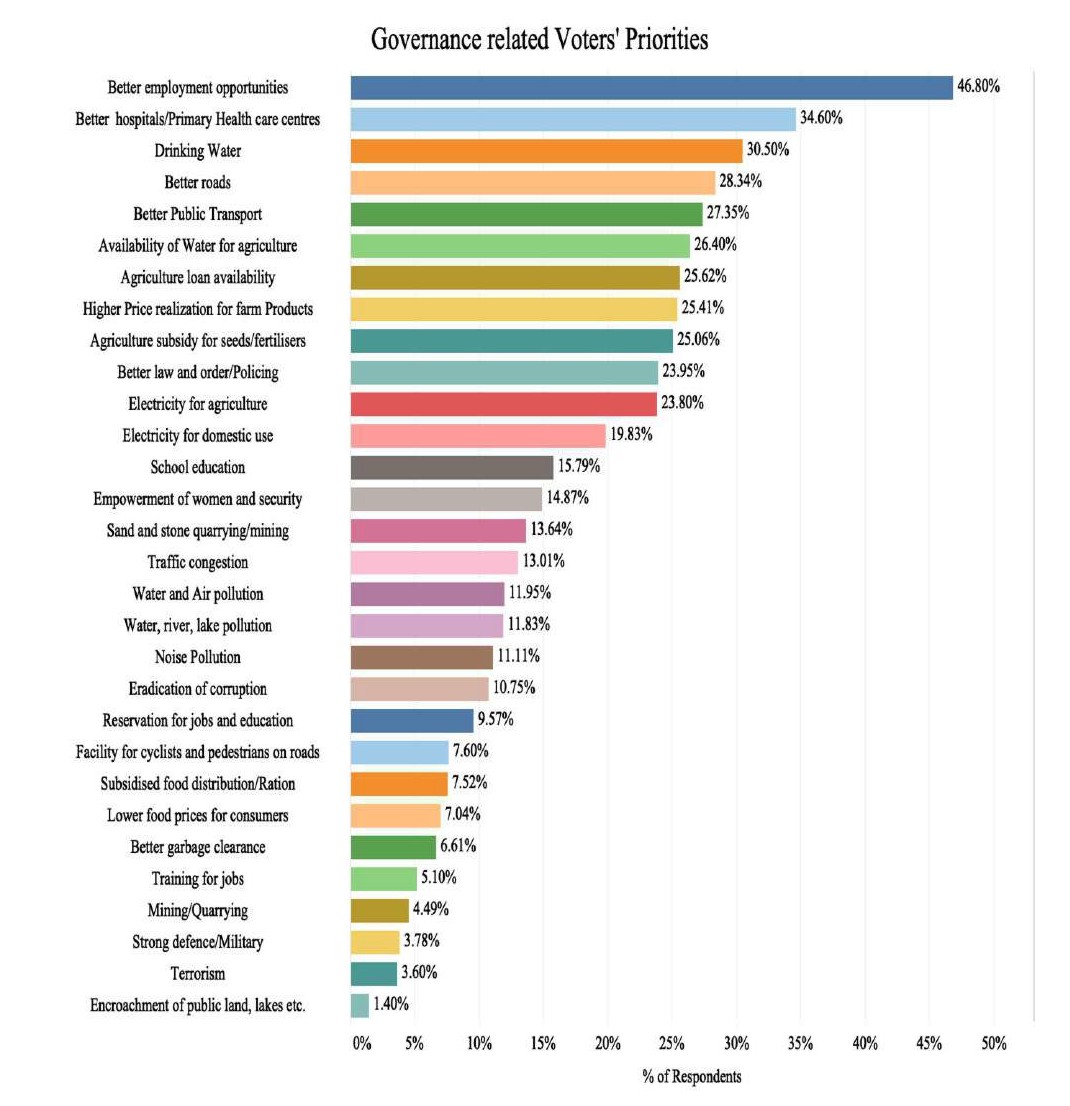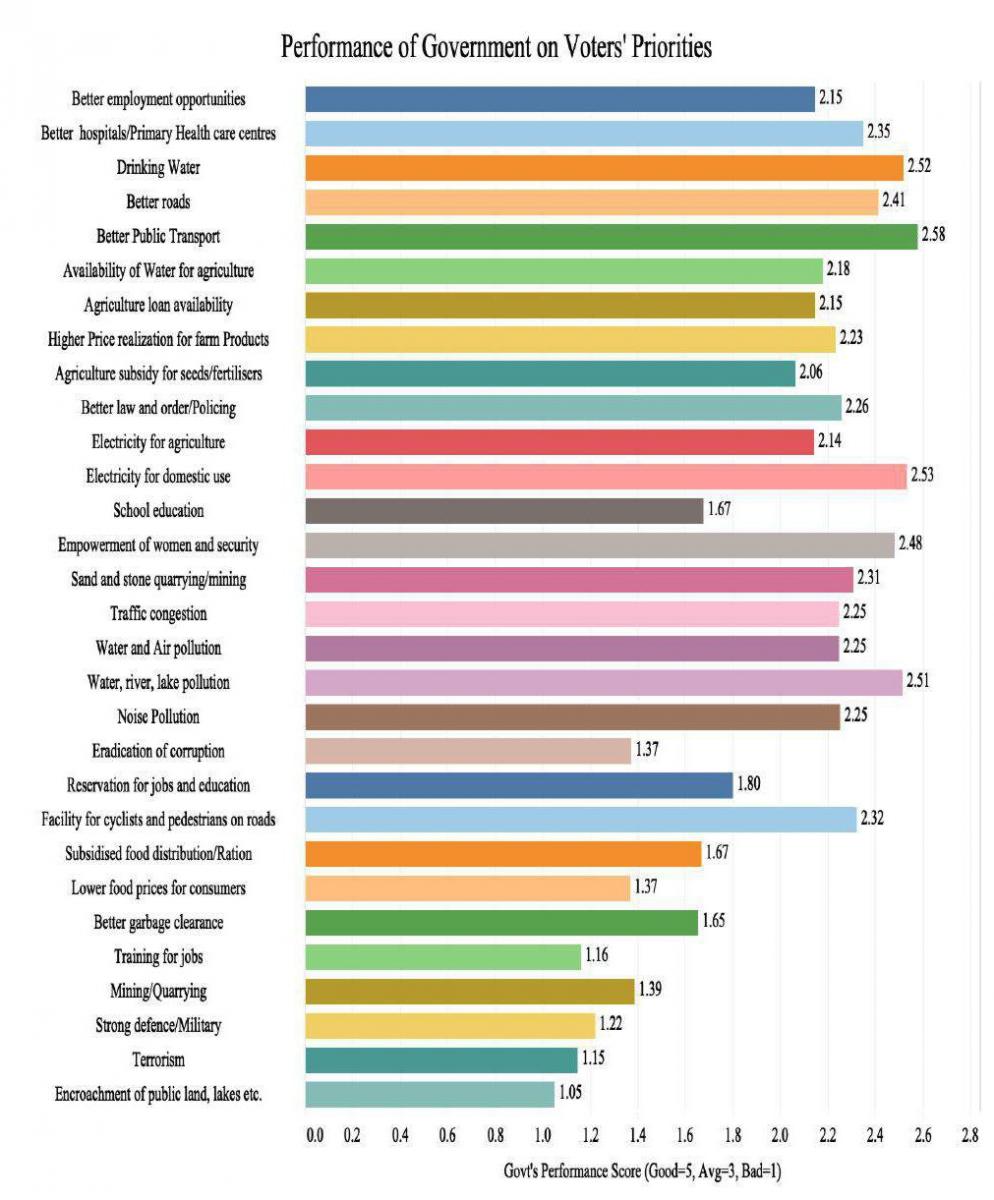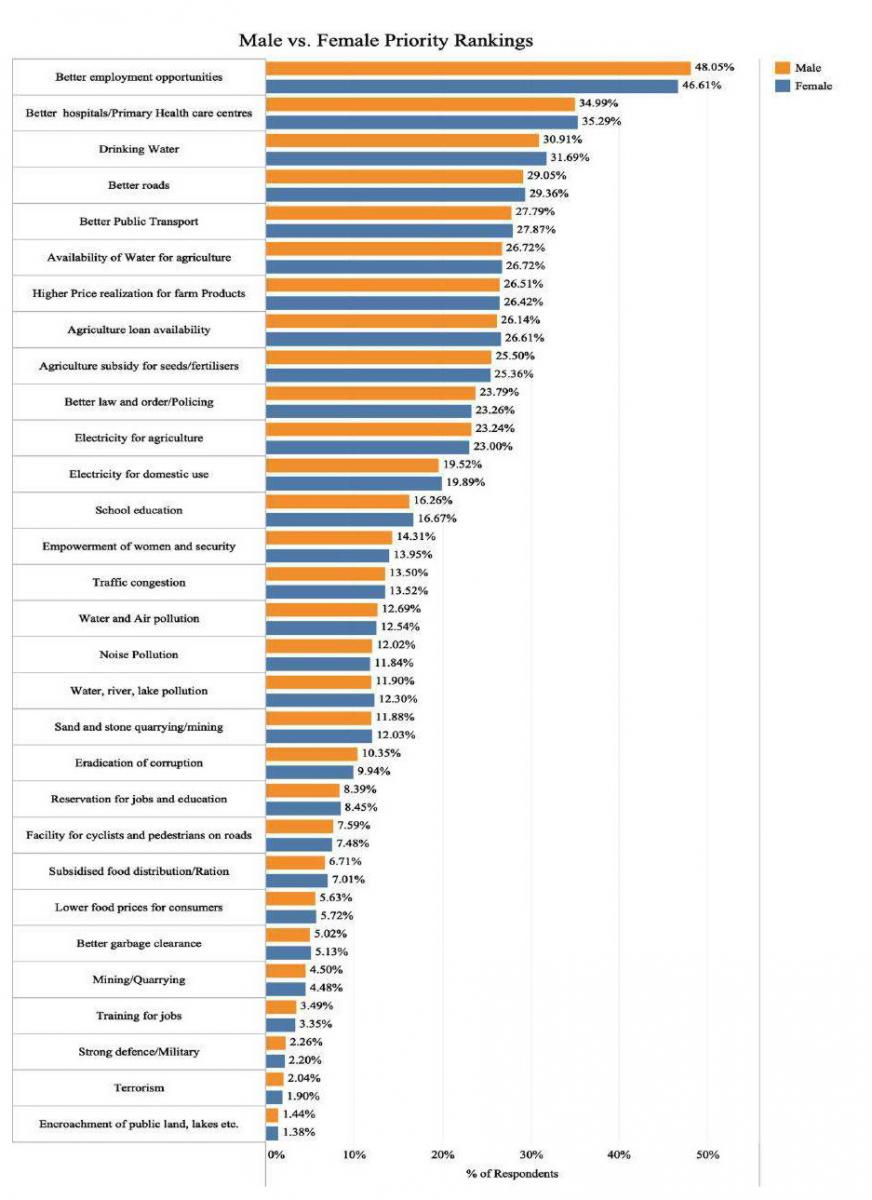At all India level, across states and across various categories; Better Employment Opportunities and Better Health Care, remained amongst the topmost voters’ priorities. Also, these two voters’ priorities have continued to remain at the top at all India level since 2017.

The Association for Democratic Reforms (ADR) commissioned perhaps the largest ever Voter Survey in any country. The survey was conducted between October 2018 and December 2018, prior to the General Elections to the Lok Sabha 2019. It covered 534 Lok Sabha constituencies with 2,73,487 voters participating in this exercise spread among various demographics. The three main objectives of this survey were to identify the following: (i) voters’ priorities on specific governance issues, (ii) voters’ ratings of the government’s performance on those issues, and (iii) factors affecting voting behaviour.
The survey highlights the voters’ priorities on 31 listed issues like drinking water, electricity, roads, food, education, healthcare, public transport etc. in their respective regions in terms of its capacity, governance and specific role in improving their living conditions. For assessing this, voters were asked to list their top five priorities. These voters’ priorities were further analyzed in relation to the performance of the Government on those issues as perceived by the voters. A three-level scale of Good, Average and Bad was used, where Good was given weightage equal to 5, Average was weighted 3 and Bad was weighted as 1.
The Association for Democratic Reforms (ADR) commissioned a survey of members of the eligible electorate—citizens who are of 18 years and above—during October to December 2018 in order to ascertain voters’ priorities on specific governance issues, their perception of the government’s performance on those issues and also to identify the factors that are influencing voting behaviour. The other objectives of the survey were to assess eligible voters’ – expectations from the government, opinion regarding criminal candidates contesting in elections, exposure to inducements for the vote, level of awareness regarding the role of crime and money in elections, and general attitudes regarding the electoral process in a democracy.
Of the 2,73,487 voters selected for the sample, 64.88% were men and 35.12% were women. 65.28% of respondents were between 18 and 40 years of age. 64.84% of respondents were from rural locations while 35.16% were from urban India.
All throughout the survey – at all India level, across states and across various categories – Better Employment Opportunities and Better Health Care, remain amongst the topmost voters’ priorities. Also, these two voters’ priorities have continued to remain at the top at all India level since 2017. It is a matter of great concern that the voters have rated the performance of the government on all 31 listed governance issues as Below Average.
97.86% voters felt that candidates with criminal background should not be in Parliament or State Assembly, nevertheless, there were 35.89% voters who were willing to vote for a candidate with criminal records if the candidate has done good work in the past.
In the conclusion of this survey, it was stated that over the last two years, governments in power, both at the Centre and state/UT level, have neglected voters’ priorities. This is conspicuous in the poor and the underwhelming performance of a majority of governments across states/UTs on top governance issues as rated by their respective voters.
Key Findings
Table 2: All India Importance of Top 10 Governance Issues
Graph 1: Top 10 Voters’ Priorities and Performance Scores in India
It is quite clear from the top 10 Voters’ Priorities that Indian voters prioritize employment and basic amenities (like Healthcare, Drinking Water, Better Roads etc.) above all governance issues (including Terrorism and Strong Defence/Military). This indisputably is a result of prevailing governance deficit in these sectors that are causing deprivation to the average Indian voter besides also leading to the denial of their fundamental rights like Right to live with human dignity as embodied in the Article-21 of the Constitution. For inclusive and equitable development, it is important that the government ensures that such basic services reach all sections of the society, as it is key to developing human capabilities.
“The government’s performance score on the top 10 voters’ priorities is below average. This evidently indicates that the voters are unsatisfied with the government’s performance. Hence, the government needs to prioritise and invest more particularly in these sectors. On Better Employment Opportunities, which is the top most voters’ priority, the performance of the government has been rated as one of the worst (2.15 on a scale of 5)” the survey found.
The graph below shows ranking of governance issues, as per voters’ priorities.

The graph below shows the performance of the government on governance issues, as rated by the
voters.

Voters’ priorities and government’s performance
- As per All India Survey 2018, Better Employment Opportunities (46.80%), Better Health Care (34.60%) and Drinking Water (30.50%) are the top three voters’ priorities at the all India level, followed by Better Roads (28.34%) and Better Public Transport (27.35%) at the fourth and the fifth place, respectively.
- It is important to note that agricultural related governance issues featured predominantly in the all India top 10 voters’ priorities e.g. Availability of Water for Agriculture (26.40%) that was ranked sixth, Agriculture Loan Availability (25.62%) that was ranked seventh, Higher Price Realization for Farm Products (25.41%) that was ranked eighth, and Agriculture Subsidy for Seeds/Fertilisers (25.06%) that was ranked ninth.
- The other top two voters’ priorities, Better Healthcare (2.35) and Drinking Water (2.52) were also rated as below average. Better Healthcare was ranked seventh and Drinking Water was ranked third.
- It is a matter of serious concern that for none of the 31 listed voters’ priorities, the performance of the government was rated as average or above average.
- The worst performance of the government, as rated by the voters, was on the issues of Encroachment of Public Lands, Lakes etc., Terrorism, Training for Jobs, Strong Defence/Military, Eradication of Corruption, Lower Food Prices for Consumers and Mining/Quarrying.
- The comparative analysis between All India Mid-Term Survey 2017 and All India Survey 2018 reveals that the top two voters’ priorities (Better Employment Opportunities and Better Hospitals/Primary Healthcare Centres) have continued to remain at the top.
- The significance of Better Employment Opportunities as voter’s highest priority has increased by 56.67% from 30% in 2017 to 47% in 2018. At the same time, the performance of the government on this issue declined from 3.17 to 2.15 on a scale of 5.
- The significance of Better Hospitals/Primary Healthcare Centres as voter’s second highest priority has increased by 40% from 25% in 2017 to 35% in 2018. At the same time, the performance of the government on this issue declined from 3.36 to 2.35.
- The significance of Drinking Water as voters’ priority has increased by 150% from 12% in 2017 to 30% in 2018. At the same time, the performance of the government on this issue declined from 2.79 to 2.52.
- The significance of Better Roads as voter’s priority has increased by 100% from 14% in 2017 to 28% in 2018. At the same time, the performance of the government on this issue declined from 3.1 to 2.41.
- Amongst the 32 states and UTs that were surveyed, in 29 of them, voters have given below average ratings to the government for its performance on all top 3 voters’ priorities at the state level. This is with the exception of Dadra and Nagar Haveli, Daman and Diu and Puducherry.
- Out of all the 8 Empowered Action Group (EAG) states, which are considered as most socio-economically backward, in 7 states (Bihar, Chhattisgarh, Jharkhand, Madhya Pradesh, Rajasthan, Uttarakhand and Uttar Pradesh) Better Employment Opportunities is the foremost voters’ priority.
- Drinking Water is the topmost voters’ priority in 3 States/UTs like Odisha, Karnataka and Daman and Diu.
Voting behaviour
- As per All India Survey 2018, 75.11% voters disclosed that CM candidate was the most important reason behind voting for a particular candidate, followed by candidate’s party (71.32%) and the candidate (68.03%) himself/herself.
- It is distressing to see that for 41.34% voters, distribution of cash, liquor, gifts etc. was an important factor behind voting a particular candidate in an election.
- In relation to voting candidates with criminal antecedents, a maximum number of voters (36.67%) felt that people vote for such candidates because they are unaware of his/her criminal records. 35.89% of voters are also willing to vote for a candidate with criminal records if the candidate has done good work in the past.
- Although 97.86%of voters felt that candidates with criminal background should not be in Parliament or State Assembly, only 35.20%of voters knew that they could get information on criminal records of the candidates.
Men and women while having many common priorities also gave a sneak peek into what both of them want the government to improve. Women voters prioritised primary healthcare, hospitals, agriculture loan availability, drinking water, electricity for domestic use, better public transport, school education more than Male voters.
All India Male vs. Female Voters’ Priorities

“We believe that the assessment report can be an important tool in engendering improvements within all institutions in refining their own institutional practices and developing better oversight of other bodies. We hope the report will be instrumental in starting a coordinated effort to work together to ensure the most efficient use of resources to serve the nation as a whole. Please find a link to the report on our website,” they said in a statement. They also added that a detailed State-wise survey reports will be released before the scheduled polling dates of respective states.
“This effort over 10 years supplements the work that ADR has done since 1999 for better elections and for political party reforms. ADR has always stayed away from partisan politics and works for the empowerment of the ‘common’ voter. As part of that work, we put out candidates’ data before elections so that voters can make an informed choice. ADR also raises voter awareness through nationwide Election Watch Campaigns. Many of them are in regional languages and are carried out directly in rural areas. The youth have also responded favourably to these efforts and many have joined as volunteers, as have a wide network of non-political, non-partisan organizations. ADR also strategically works with the Courts and the Right to Information Act to try and bring about some much-needed changes in our system and raise public awareness on crucial issues like election funding, political party funding and so on,” Prof. Trilochan Sastry, IIM Bangalore, Founder-Chairman, ADR said in the survey.